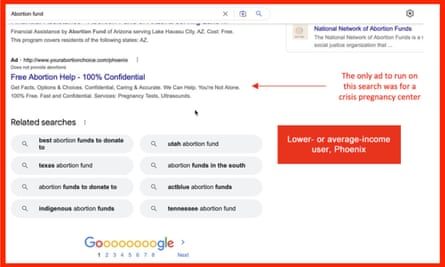Low-income women in some cities are more likely than their wealthier counterparts to be targeted by Google ads promoting anti-abortion crisis pregnancy centers when they search for abortion care, researchers at the Tech Transparency Project have found.
The research builds on previous findings detailing how Google directs users searching for abortion services to so-called crisis centers – organizations that have been known to pose as abortion clinics in an attempt to steer women away from accessing abortion care.
The researchers set up test accounts in three cities – Atlanta, Miami and Phoenix – for women of three different income groups suggested by Google: average or lower-income rate, moderately high-income rate and high-income rate. They then entered search terms like “abortion clinic near me” and “I want an abortion”. In Phoenix, 56% of the search ads shown to the test accounts representing low- to moderate-income women were for crisis centers, compared with 41% of those served to moderately high-income test accounts and 7% to high-income accounts. In Atlanta, 42% of ads shown to the lower-income group were for crisis pregnancy centers, compared with 18% for moderately high-income women and 29% for high-income women.
In Arizona and Florida abortion is banned after 15 weeks of pregnancy. In Georgia, it is banned after six weeks, at which point many people do not know they are pregnant.
“By pointing low-income women to [crisis pregnancy centers] more frequently than higher-income women in states with restrictive laws, Google may delay these women from finding an actual abortion clinic to get a legal and safe abortion,” says Katie Paul, the director of the Tech Transparency Project.
“The time window is critical in some of these states,” she adds.
Lower-income women are the group least likely to be able to travel for abortion care because traveling can cost thousands of dollars in lost work, transportation, babysitting and accommodation fees.

“Lower-income women are being targeted, and they’re the ones that are going to suffer the most under these policies,” Paul says.
The results were not the same in all cities. In Miami, researchers saw the inverse result: high-income women were more likely to get ads from crisis centers than lower-income women. The researchers say they cannot be certain why Miami diverged from the other cities but speculate that crisis pregnancy centers might more actively target low-income women in more restrictive states. (While Arizona and Florida both ban abortion after 15 weeks, the former has more restrictions layered on the 15-week limit.)
While pregnancy crisis centers offer pregnant women resources such as diapers and pregnancy testing, they have also been known to employ a number of shady tactics to convince women seeking an abortion to keep their pregnancies. Those include posing as abortion clinics online though they do not offer abortion care, refusing pregnancy tests for women who say they intend to have an abortion and touting widely disputed research about abortion care to patients. Crisis centers, which go largely unregulated despite offering medical services, have been known to target low-income women precisely because they find it harder to travel out of state for abortion care.
Although companies buying ads with Google can selectively target the groups they want to reach – including by income – Paul adds that many users won’t be aware they are being targeted by Google in this way.
“Google has a large share of influence, particularly in the United States when people are trying to search for authoritative information. And people generally tend to consider Google’s search engine as an equaliser. They think the results they get are the results that everyone’s going to get. But that’s just not the case,” Paul says.
Last year, Google came under fire after a Tech Transparency Project investigation found the company was serving people with ads for pregnancy crisis centers suggesting they offer abortions even though they do not – violating the platform’s own rules on misleading advertisements.
Google has repeatedly been pressed to make changes to its search engine to curtail these issues. In 2022, Senator Mark Warner of Virginia and Representative Elissa Slotkin of Michigan wrote to the company twice, urging it to stop misdirecting users searching for abortion care to these crisis centers in Google Maps. The lawmakers also called on Google to limit the way crisis centers appear in search results and ads, and to add disclaimers clearly indicating whether a search result is an organization that provides abortions or not.
Google responded by pledging to clearly label these facilities in the future. But researchers in the study also found a number of ads still being served to users suggesting centers offer abortion care when they do not.
In Phoenix, a Google search by a lower- or average-income test account for “Abortion fund” – an organization that provides financial and other forms of support for abortions – yielded an ad with the text “Free Abortion Help – 100% Confidential”, for a crisis center.
Similarly, when the lower- or average-income Atlanta test account searched for “Planned Parenthood Atlanta”, Google produced a single ad that read “Abortion Consultation for Free”, with an ad linking to a crisis pregnancy center called Health for Her in Atlanta. Although some of the ad results in the Tech Transparency Project’s study included a label stating “Does not provide abortions”, this one, along with several others, did not – in contravention of Google’s own labeling rules.

Slotkin said she was disappointed to learn the company is still failing to regulate crisis centers on its platform, despite having been in touch with them twice about the issue.
“Michigan has roughly 100 pregnancy crisis centers that explicitly do not provide abortions, and these clinics should not be listed among abortion providers,” Slotkin said.
“We sent a second letter in November because Google was still failing to consistently apply disclaimers to misleading ads. Despite our action – and assurance from Google that they would only show verified abortion providers when a woman was seeking the procedure – these findings from TTP [Tech Transparency Project] prove there’s clearly more work that needs to be done,” she said.
Senator Mark Warner’s office added: “Ads from ‘crisis pregnancy centers’ that reference ‘Free Abortion Help’ or ‘Abortion Consultation’ are obviously not in compliance with Google ads policies that forbid ads ‘that deceive users by excluding relevant product information or providing misleading information’. I urge Google to take action to prevent these deceptive advertising practices meant to trick users, especially low-income women.”
The Guardian contacted Google for comment and on Monday evening an unnamed spokesman sent a response.
“We don’t allow advertisers to specifically target a ‘low income’ bracket with ads, and we have strict rules about how location can be used to serve locally relevant ads. It’s important that people seeking abortion-related resources know what services an advertiser actually provides, so we require any organization that wants to target queries related to getting an abortion to be certified and clearly disclose whether they do or do not offer abortions. Last year, we updated these disclosures to make them more visible for users,” the response said.
